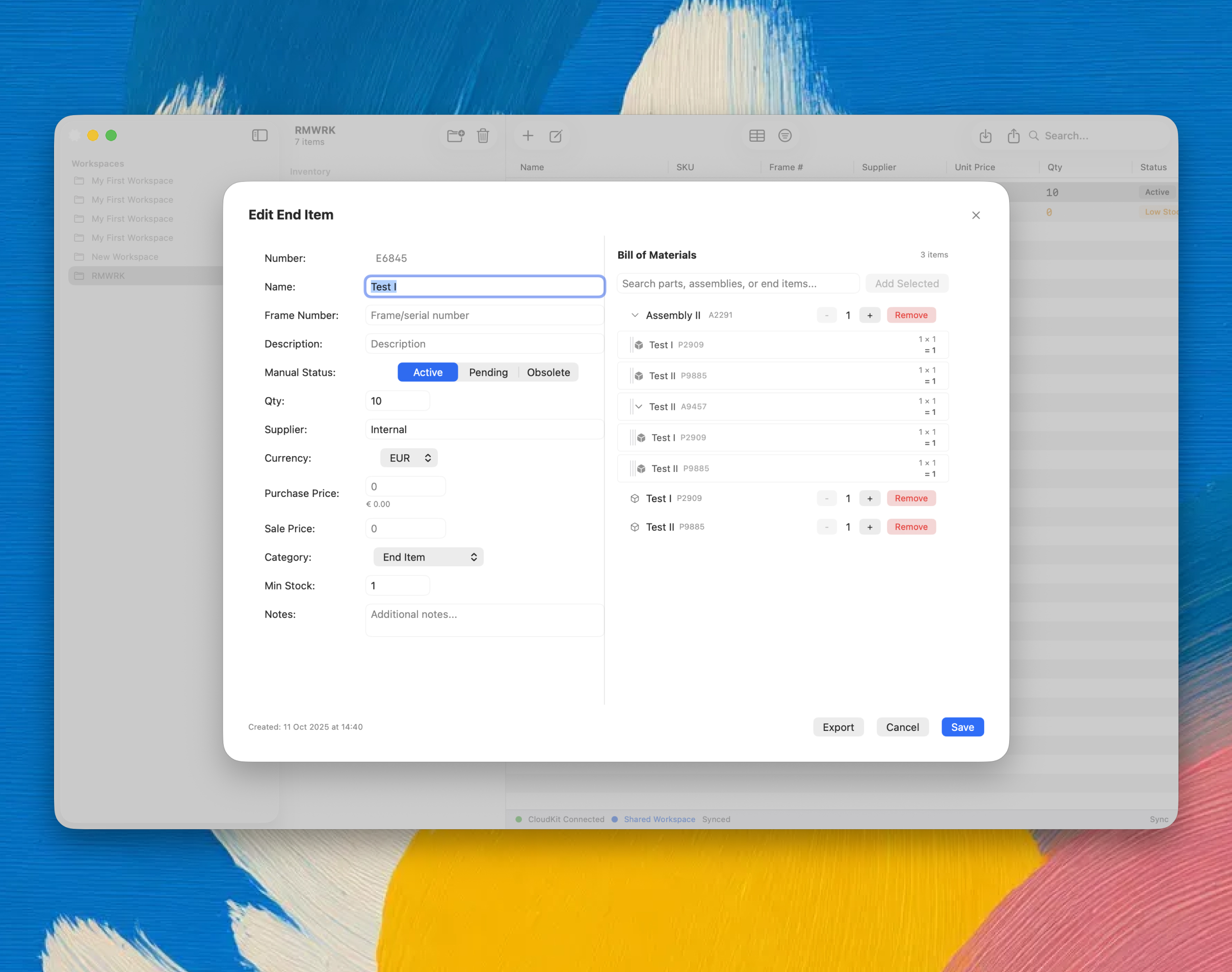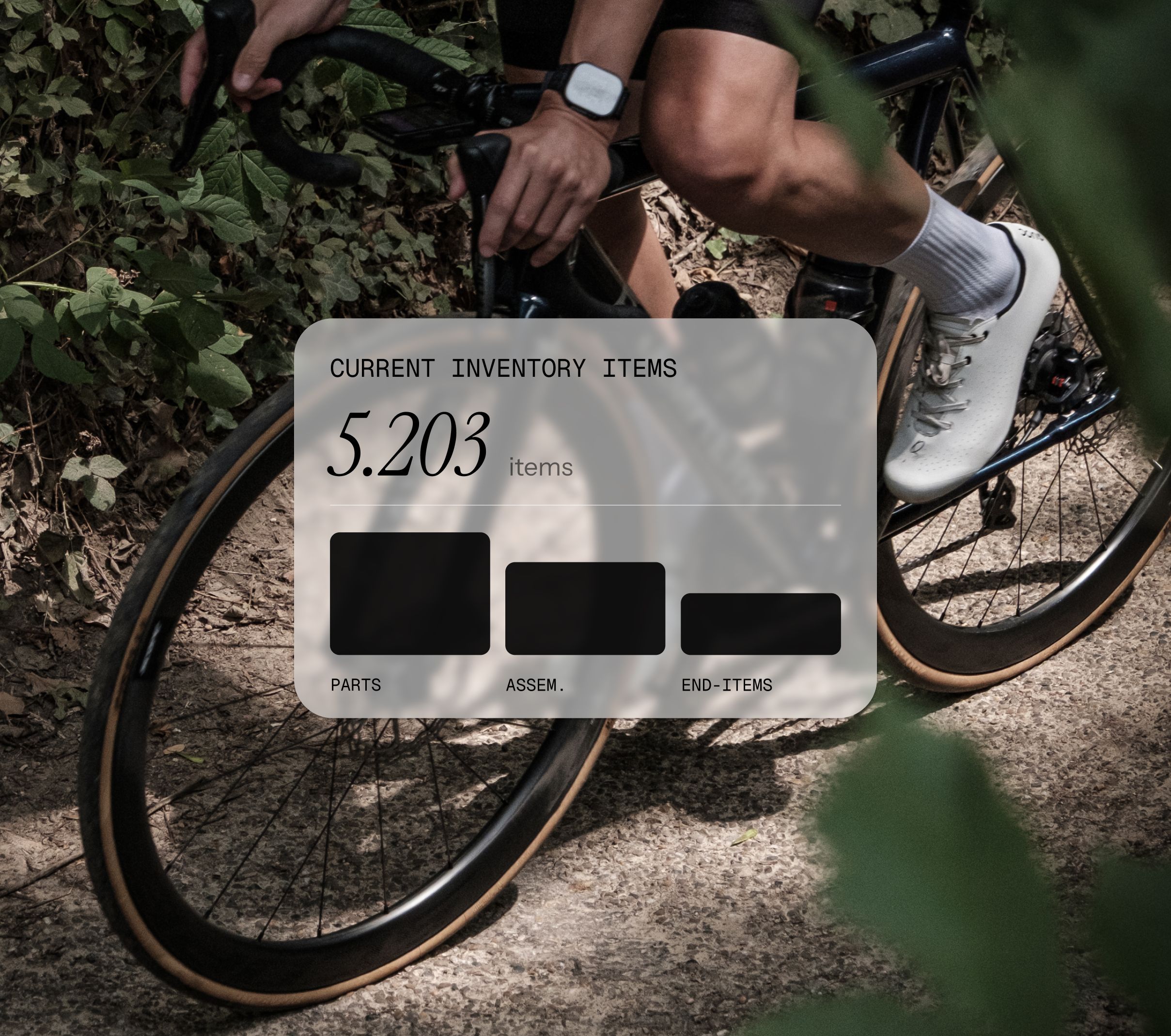The breaking point came during a routine production run. A key component showed as "in stock" in their spreadsheet, but the actual count was zero. By the time they discovered it, they'd committed to three orders they couldn't fulfill. The component was buried in a sub-assembly, and their spreadsheet only tracked top-level inventory. They had visibility into what they sold, but not what they needed to build it.
That's when they found Verso.
Clarity replaces guesswork
Inventory management at scale isn't just about counting boxes, it's about understanding dependencies. Verso's multi-level assembly tracking showed Raamwerk not just what was in stock, but what they could actually build with current inventory. When they looked at a finished product, they instantly saw every component required, current quantities, and, critically, what would run out first.This clarity changed how they planned. Instead of reacting to stockouts, they saw them coming. Instead of over-ordering to create safety buffers, they ordered precisely what they needed. Inventory became predictable, and everything downstream got easier.
Smart workflows eliminate invisible work
Before Verso, Mark and Sofia spent hours each week reconciling inventory across channels. Every platform generated its own reports. Combining them meant copying, pasting, and hoping nothing got lost. By Thursday, they knew Monday's numbers.
Verso made reconciliation unnecessary. When a retail partner placed an order, inventory updated immediately. When components arrived, the system reflected it instantly. They stopped asking each other "did you update the inventory?" The mental overhead of managing data vanished. What replaced it was confidence.
Smart workflows aren't flashy, but you feel their absence immediately. They realised this during a client meeting when she instinctively looked for assembly details in their system, and they didn't exist. Raamwerk understood how much friction Verso had quietly removed.

Preparing for growth means knowing your capacity
Raamwerk's multi-channel strategy required answering one question: What can we commit to?
With spreadsheets, this took hours of manual calculation, estimating demand, cross-referencing inventory, factoring lead times, and hoping the math was right. Verso answered it instantly. They could model scenarios: If we accept this bulk order, can we still fulfil retail commitments? The system showed exactly what they could build, what they needed to order, and when.
This visibility transformed their sales strategy. They stopped declining opportunities out of uncertainty and started accepting them with confidence. Growth stopped feeling risky and started feeling manageable.
The compound effect of small improvements
Six months in, Raamwerk's operations looked fundamentally different, not because they changed their process, but because they removed friction.
They weren't reconciling inventory in the evenings. They weren't second-guessing stock levels. They weren't over-ordering "just in case." All that energy previously spent managing chaos was redirected toward growth.
Raamwerk onboarded new retail partners. Are preparing for a new product launch. They're preparing for further expansion in Q1. None of this required additional operations staff. The two of them still run everything, but now from a position of clarity, not chaos.
What defines a Verso workflow?
They surface the right data at the right time
No more digging through spreadsheets. Verso shows component availability, assembly status, and production capacity exactly when you need it.
They flag issues before they cascade
Low stock warnings trigger before you run out, giving time to reorder before production is impacted. Problems that caused delays now get resolved before they start.
They replace status updates with live visibility
Both founders see real-time data whether they're in the office or at supplier meetings. No more "let me check and get back to you."
They work with your existing channels
Verso integrates naturally with how you already work, direct sales, retail partnerships, or online marketplaces.
These aren't just features, they're reflections of respect for how small, ambitious teams operate. When systems feel intuitive and supportive, you naturally focus more energy on growth. And that shift doesn't require months of onboarding, it happens on day one.
From managing to understanding
After a year with Verso, they reflected: "We used to manage inventory. Now we understand it. When you're managing, you're reacting, chasing numbers, fixing errors. When you understand, you're planning. You see patterns, constraints, opportunities. That shift from reactive to proactive? That's what let us grow."
They added: "The best systems disappear. Verso did that for us. We don't talk about our inventory system anymore. We talk about our growth strategy. That's the whole point."
Raamwerk isn't special. They don't have venture funding or a large team. They have a great product, ambitious goals, and a system that lets them execute without friction. Verso didn't change their business, it removed the barriers holding them back.
Smart workflows deliver that, not someday, but on day one.



